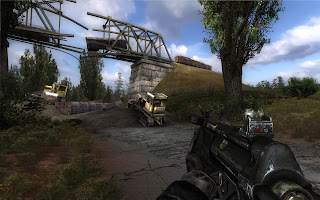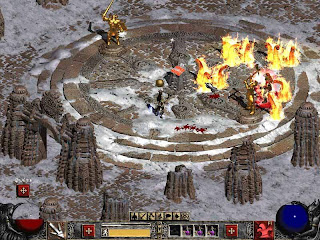One of the major points I made while advocating the need for level scaling was the issue of creating non-linear games. But I imagine some might put forward the argument that some games with somewhat linear paths didn't or don't always put in you in areas where you could easily defeat all the enemies. For example, Ultima Underworld 2. The game isn't entirely linear - as the game progresses, you gain access to a couple of new worlds at a time, allowing you to pick any of them to progress the plot. And even in linear sections, such as the castle basement/sewers, you can quite easily come across monsters far too powerful for you to defeat. I'll also get the Baldur's Gate argument here as well.
It's a family reunion of giant green bugs. Yuck.
The thing is, I can concede there's a point here, even though both games are still primarily linear. It's potentially possible to go out of your way and get destroyed by powerful monsters (or fluke a victory), but that's not what the designers intended. Additionally, the games are segmented so that it is not possible to access filled only with significantly more powerful encounters until you had gained enough experience to be ready for them. In Baldur's Gate you couldn't just happen across Cloakwood, and in Ultima Underworld 2 you couldn't just jump straight to the Pits of Carnage or the Ethereal void. The game was segmented to stop you from pursuing things far beyond your league. (And to prevent you short-circuiting the linear plot of the game) Of course, we could also argue the benefits of non-linearity as presented in Dragon Age, but that's another issue entirely...
Another major point to consider is the issue of backtracking. Backtracking is where the player has to traverse and area that they have already explored, typically without any change to the environment. If the player has to do this multiple times, it can get very tedious. This is one area where the original Baldur's Gate can suffer quite a bit, and Morrowind is particularly susceptible to it. Oblivion's fast travel system reduced the level of backtracking required over Morrowind, even though some (incorrectly) tried to suggest it was a shortcoming rather than an improvement.
With a mod making it pretty, I wanted to use the map even more.
Adding in new enemies to areas that have already been explored is a potential means to reduce the tedium, but if this is done repeatedly, it can actually make the situation worse. Again, case in point here is Baldur's Gate, with the "you have been waylaid by enemies and must defend yourself" message, which became an exercise in annoyance at higher levels where the enemies posed no real threat to you. Even if those encounters had been scaled, it would have been more an exercise is frustration than enjoyment. Also see S.T.A.L.K.E.R. and Far Cry 2 for examples of how this really can make a game far less enjoyable, if not outright annoying.
Get out of here, respawning enemies.
Another issue to consider is the power scale inherent in the combat mechanics used within the game. One of the problems in addressing an increasing power of both the player character(s) and their enemies is that degree by which their strength grows as they progress through the game. If you do a comparison of something like a first person shooter, the overall difficulty of the enemies increases somewhat, but nowhere near to the degree of something like Diablo 2. Going up to the later stages of the game on "Hell" difficulty meant that enemies could have several thousands of hitpoints and do hundreds of points of damage with a single attack. This is from a starting point where you were potentially talking single digit hitpoint and damage totals.
If your game has a combat system where that kind of progression can occur, then any non-linearity means that the difficulty of balancing those encounters will likely correlate with the power of level progression. That is, as a general rule, the more power a character gains from each level of experience, the harder it will be to provide balanced combat across a range of levels. However, if a character doesn't gain much power from each level of experience, then the sense of achievement from gaining a new level could begin to feel somewhat hollow. Balancing these two things is not any easy task.
Justified, ancient, and butt-kicking for goodness
Finally, we come to the thorny issue of time. Ultimately, there is a limited amount of time when creating a game. Time is money, and as such, neither is unlimited. (Note: if you somehow have unlimited money and love RPGs, hire me and I'll work on creating them non-stop) As such, there needs to be a simple way to provide challenging combat for players. So we want to be able to implement a scaling technique that automatically adjusts enemy power based on the player's power - which is precisely what level scaling does.
The key here is the word "automatically". Ideally, the designer will be able to set up an encounter, and then the scaling mechanisms within the game/game engine will ensure that no matter at what point the player comes across it, the monsters will be of an appropriate strength to provide a reasonable combat challenge to the player. If the designer has to manually adjust the strength of an encounter based on the possible level ranges of the character when they find it, then the whole process quickly becomes very time consuming. Again, this ties in with the power scaling per level issue I've mentioned above, and compounds the issue even further. Talking in rough equation terms: time required to design combat ~= number of encounters * power differential per level * possible level ranges. Of course, we could then add in factors such as party composition, but then we're dealing with a whole other kettle of fish regarding encounter balance based on class/party make-up, and that can be difficult at the best of times.
So with all this discussion about encounter scaling, we can probably finally start looking at means to help provide better solutions, but that will have to wait for another day.








No comments:
Post a Comment